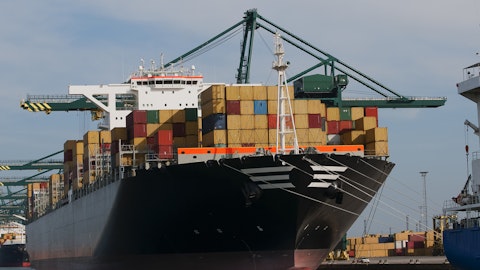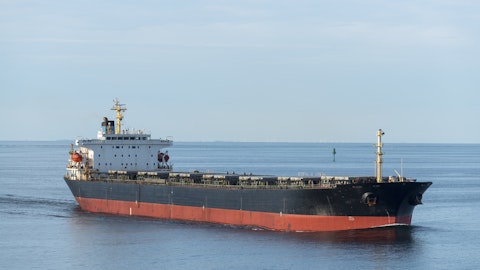Peder Simonsen: Thank you.
Operator: Thank you for your question. We are now taking the next question from from BTIG. Please go ahead.
Unidentified Analyst: Good morning. Thanks for taking my question. On IMO €˜23, you have a relatively new fleet, but are there any vessels that could be adversely affected by new regulations? I know you said you are looking to divest some of the older fleet. And then beyond slow steaming, what could the impact be for the broader fleet in terms of retrofitting?
Ulrik Andersen: The €“ I didn’t get the second part of the question, but maybe we can come back to that, and I will just answer the first to begin with. So, our average age is 6 years for the fleet, which obviously puts us in a very good position. Hello, is my sound coming through?
Unidentified Analyst: Yes, I can hear you.
Ulrik Andersen: I am sorry, okay. Yes. And that’s just a bit of noise. So, the average age we have is very low. In addition, we have been in the past 12 months or more vested quite heavily into the fleet and upgrades and digitalization. So, our, you can say, fleet average today would be a B rating on the CII. But of course, that’s a theoretical rating. So, in real life, it depends on how you utilize your fleet. And if your vessel is getting stuck somewhere in China for reasons outside of your own control or the ship owner’s control, you can still receive a lower score. But the point is that if you look at the fleet average, we have a very, very good starting point. So, we are ready for IMO 2023. We do have, of course, some outliers in our fleet.
We have some that are around 10-years-old. They are not actually that old if you look at the rest of the fleet out there. But for us, they are older, at least. And some of these vessels will have to be EPL, meaning that we will have to cap the top speed of this €“ of the engine. And of course, that will give them less flexibility. And that’s also what I referred to when I spoke previously on the supply side optimism. One of the, can you say, factors here is that there are a lot of vessels that are from 10,000 and before that will have to cap their engines. And obviously, that means the less efficiency. So, we are not €“ can you say €“ we will have to do some changes to our fleet, but they are minimal compared to the effect that it will have on a fleet-wide basis, on a global basis where it will take out capacity, which all other things equal, should aid the freight environment in a positive way.
So, I think €“ I hope that was the answer to the first question.
Unidentified Analyst: Yes, that was very helpful. The second part to it was just kind of beyond €“ like you say, your fleet is new, but beyond looking at the broader fleet, beyond slow steaming, what could the impact be in terms of could we see retrofits? Is there anything else that could drive utilization higher next year just beyond ships capping their speed?




